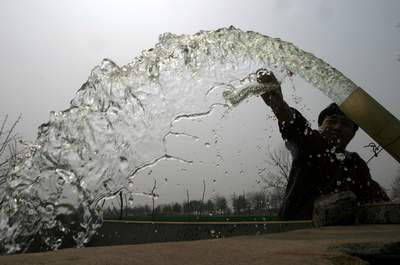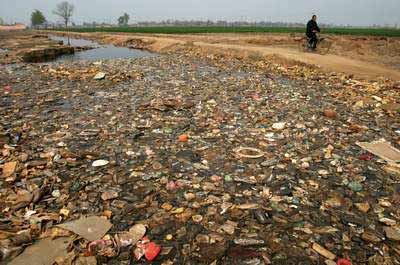By Andrew C. Revkin
Monday, April 2, 2007
Over the last few decades, as scientists have intensified their
studies of the human effects on climate and of the effects of climate
change on humans, a common theme has emerged: in both respects, the
world is a very unequal place.
In almost every instance, the people most at risk from climate
change live in countries that have contributed least to the atmospheric
buildup of carbon dioxide and other greenhouse gases linked to the
recent warming of the planet.
Those most vulnerable countries also tend to be the poorest. And the
countries that face the least harm - and are best equipped to deal with
the harm they do face - tend to be the richest.
To advocates of unified action to curb greenhouse gases, this growing realization is not welcome news.
"The original idea was that we were all in this together, and that
was an easier idea to sell," said Robert Mendelsohn, an economist at
Yale University.
"But the research is not supporting that. We're not in it together."
The large industrialized countries are more resilient partly because
of geography; they are mostly in mid-latitude regions with Goldilocks
climates - neither too hot nor too cold.
Many enjoy gifts like the thick rich soil and generous growing
season of the American corn belt or the forgiving weather of France and
New Zealand.
But a bigger factor is their wealth - wealth built at least partly
on a century or more of burning coal, oil and the other fossil fuels
that underlie their mobile, industrial, climate-controlled way of life.
The United States, where just 4 percent of the economy is in
agriculture, can endure a climatic setback far more easily than a
country like Malawi, where 90 percent of the population is rural and
where about 40 percent of the economy is driven by rain-fed agriculture.
As big developing countries like China and India climb out of
poverty, they emit their own volumes of greenhouse gases; China is
about to surpass the United States in annual emissions of carbon
dioxide.
But they remain a small fraction of the total human contribution to
the atmosphere's natural heat-holding greenhouse effect, which is
cumulative because of the long-lived nature of carbon dioxide and some
other heat-trapping gases.
China may be a powerhouse now, but it has contributed less than 8
percent of the total emissions of carbon dioxide from energy use since
1850, while the United States is responsible for 29 percent and Western
Europe 27 percent.
Disparities like these have prompted a growing array of officials in
developing countries and experts on climate, environmental law and
diplomacy to insist that the first world owes the third world a climate
debt.
"We have an obligation to help countries prepare for the climate
changes that we are largely responsible for," said Peter Gleick, a
co-founder of the Pacific Institute for Studies in Development,
Environment and Security in Berkeley, California.
Around the world, there are abundant examples of how wealth is
already enabling some countries to gird against climatic and coastal
risks while poverty, geography and history are placing some of the
world's most crowded, vulnerable regions directly in harm's way.
Here are four views of the climate divide:
Twice a day, 25-year-old Harold Nkhoma checks a series of gauges at
the government's weather station here in Malawi's second-biggest city.
He skips the barometer because its light doesn't work and he can't read the figures. He has waited six months for new batteries.
He ignores the evaporation pan designed to show how quickly water is
absorbed into the soil. Peeled-off paint and missing wire mesh have
left it useless. And he bypasses the glass sphere that measures the
duration of sunshine by burning marks on paper strips.
It has been out of paper for four years.
His supervisor, Werani Chilenga, is disgusted. Broken equipment,
outmoded technology, slipshod data and a sparse scattering of weather
stations are all his national agency can manage on a $160,000 budget.
"We cannot even know the duration of sunshine in our country for
four years, so how can we measure climate change?" asked Chilenga, a
meteorological engineer. "Oh, oh, it is pathetic!"
Lack of meteorological data is just one challenge as Malawi
struggles to cope with global warming. Add to that lack of irrigation;
overdependence on a single crop, maize; shrinking fish stocks;
vanishing forests; and land degradation.
Last March, Malawi, one of the world's poorest countries with 14
million people, identified $23 million worth of urgent measures it
should take in the next three years. It delivered them to the United
Nations program to help poor nations deal with climate change.
A year later, the government is still negotiating with donors. "It
is sad that up until now we have not gotten the monies that have been
talked about," said Henry Chimunthu Banda, the minister of energy,
mines and natural resources.
That is not to say Malawi is standing still. The government is
moving toward bigger grain reserves, changes in agricultural practices
and construction of a new dam. Nine out of 10 Malawians are subsistence
farmers.
Austin Kampen, 39, is an early adapter. A nonprofit group last year
gave him hoses and a large bucket, a rudimentary but effective crop
sprinkler system.
He plants a variety of maize more likely to survive shorter growing
seasons and backs it up with cotton, cassava, potatoes and other
vegetables.
He still lost his entire harvest in January when a river overflowed
after a week of nonstop rain, submerging his seven-acre field and
leaving 75 of his neighbors homeless. Still, he said, he will manage to
plant anew this season.
Looking out over a sparkling blue bay on Australia's west coast,
Gary Crisp, an alchemist for the new century, saw an ocean of drinking
water.
Behind him was an industrial park filled with tanks, pipes, screens,
filters and chemicals for converting seawater into drinking water,
providing 17 percent of the water supply for this city of 1.5 million
people.
As the world warms and clean water becomes a prized commodity, the
Perth Seawater Desalination Plant is using the renewable resources of
wind and ocean to produce it, along with a finite resource that is less
available in many other countries: money.
The 435 million New Zealand dollar, or $313 million, plant, among
the largest in world, opened in November and is already running at
capacity, producing up to 144 million liters, or 38 million gallons, of
water a day at a cost of $3.50 per $3,800 liters.
The seawater is sucked into the plant through a pipeline whose mouth
is 200 yards offshore. Once inside, it is filtered through fine
membranes in a complex process called reverse osmosis. About half the
water is purified and sent into the city water system, to mingle with
water from other sources. The salt is flushed back out to the ocean.
The plant is one of the newest in a rapid spread of desalination
plants in countries that can afford them, particularly in the Middle
East, where oil pays for water. Southern California is home to many
smaller plants.
What sets the Perth plant apart is not only its size but its engine
- wind power. The plant is driven by power from 48 turbines in the Emu
Downs Wind Farm, about 160 kilometers, or 100 miles to the north, that
can produce 80 megawatts of electricity a day, more than three times
the needs of the plant. That avoids the trade-off at most desalination
plants, which are powered by fossil fuels that produce greenhouse gases.
"We call it alchemy - converting wind to water," said Crisp, the Perth plant's principal desalination engineer.
The treated water offers people here in the world's most arid
continent "security through diversity," in the local phrase,
complementing dams, aquifers and recycling. Water conservation could be
a powerful tool, but few politicians dare to suggest any measures more
aggressive than limiting the use of lawn sprinklers - a privation
Perth's plant is helping to avoid.
Australia is suffering some of the worst droughts in its recorded
history. Stream flows into dams in Perth have shrunk by two-thirds in
the last 30 years, even as its population swells by more than 20,000
people a year.
Perth is talking about building one and perhaps two more plants in
the coming years, and similar plants are in early stages of development
in Sydney and the town of Tugun in Queensland.
Having proved itself, the plant will have its official opening next month.
Year after year, the Bagmati River swells with the rains and,
rushing down from the Himalayas, submerges this back-of-beyond village
into utter ruin.
Year after year, it sweeps away cattle and goats. It sends mud
houses collapsing back into the earth. It kills dozens of people in and
around Dhanaur, and that's during a mild monsoon, like last year, when
Pavan Devi's 19-year-old son, Vikas Kumar, went to a communal toilet in
the fields, and was swept away by a fast-moving stream.
In 2004, the last major flood, the death toll stood at 351 in Bihar
State, which is home to this village and many others sitting on some of
the most vulnerable flood plains in India.
Their vulnerability is likely to grow. Since 1950, in concert with
global warming, rains over India have come in heavy downpours rather
than gentle showers, Indian scientists reported last year. That pattern
is raising the risk of sudden floods.
The picture in this destitute, crowded corner shows how ill-equipped
India remains in dealing with that looming danger, despite its newfound
prosperity. Nationwide, about 8 million hectares, or 20 million acres,
of land are affected by floods each year, according to the government;
they affect 4.2 million Indians each year on average, according to
Columbia University.
Here in Dhanaur, for nearly three months of the monsoon season,
everyone lives at the water's mercy. The well-off save their firewood
and food grains for the annual disaster. The poor beg and borrow to
eat, and they camp out on higher ground in tents made of cement bags.
They bathe and defecate in the floodwater. They drink from it, too.
Who can afford to boil it before drinking, a father of six named Hira
Majhi asked. Last year, after his 4-year-old son contracted black
fever, a deadly disease endemic here, Majhi rowed for an hour, in a
homemade canoe made of water hyacinth leaves. No government ambulances
ply here.
The measures taken by the government to adapt to the annual floods
are rudimentary at best. Construction on embankments upstream was
suspended 30 years ago, and is scheduled to resume later this year.
Enterprising villagers have built bamboo bridges.
Last year, for the first time, the government put an early warning
system into effect. Local officials went around with a bullhorn, on
cycle-pulled rickshaws, warning of imminent flooding. But there were no
shelters to go to, except the local village school, where there were no
drinking water or latrines.
In mid-March, the Bagmati rose up during an unexpectedly early spring flood. In less than a day, it wreaked havoc.
Sunil Kumar, one of the more well-to-do farmers here, lost three
acres of wheat, a third of his annual income. He walked across his own
soggy field and then across his neighbors', examining patches of barley
and mustard and peas all waterlogged and ruined.
"It is our misfortune living here," he said. "There is no system of water control."
Anne van der Molen lives on the edge of the Maas River, by
definition an insecure spot in a country constantly trying to keep
water at bay. But she is ready for the next flood.
Excited, even. "We haven't floated," she said of her house, "but we're looking forward to floating."
Her two-bedroom, two-story house, which cost about $420,000, is not
a houseboat, and not a floating house of the sort common across the
world. It is amphibious: resting on land but built to rise as the water
level rises.
It sits on a hollow concrete foundation and is attached to six iron
mooring posts sunk into the lake bottom. Should the river swell, as it
often does in the rain, the house will float up with it - by as much as
18 feet - and then float back down, held in place by the poles, as the
water subsides.
It is part of a new experiment in living. The 46 houses here are
meant to address two issues at the heart of the housing debate in this
low-lying, densely populated country, said Steven de Boer, a concept
developer at Dura Vermeer, the company that developed the project.
Van der Molen loves the feeling of being almost part of the river.
"Dutch people have always had to fight against the water," she said.
"This is another way of thinking about it. This is a way to enjoy the water, to work with it instead of against it."
Technorati Tags:
climate,
change,
environment 













